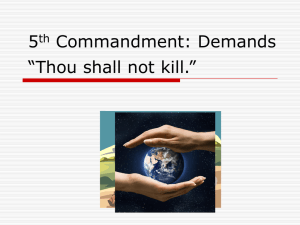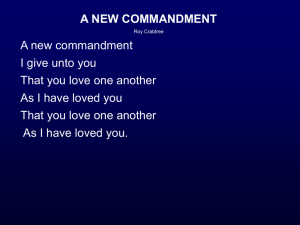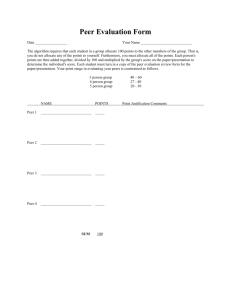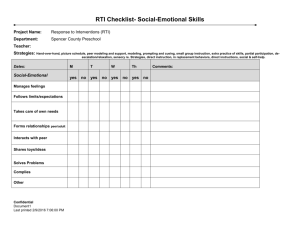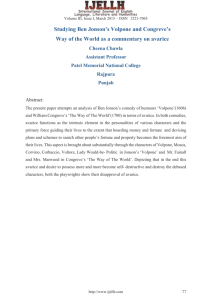GRADE 8 MORALITY
advertisement
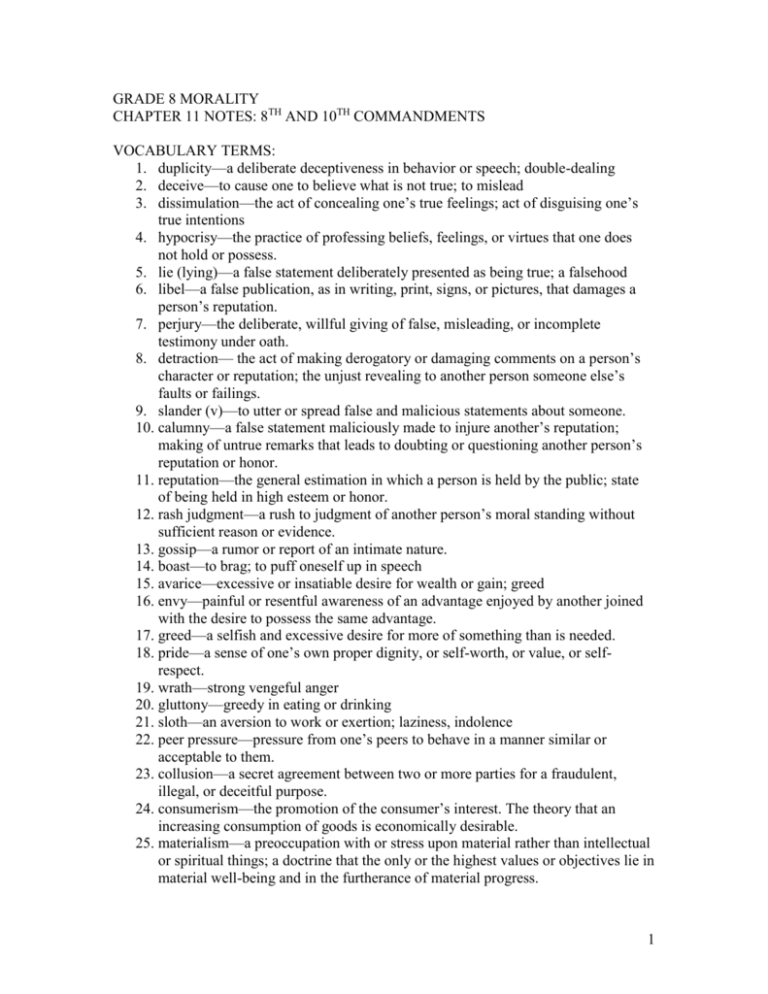
GRADE 8 MORALITY CHAPTER 11 NOTES: 8TH AND 10TH COMMANDMENTS VOCABULARY TERMS: 1. duplicity—a deliberate deceptiveness in behavior or speech; double-dealing 2. deceive—to cause one to believe what is not true; to mislead 3. dissimulation—the act of concealing one’s true feelings; act of disguising one’s true intentions 4. hypocrisy—the practice of professing beliefs, feelings, or virtues that one does not hold or possess. 5. lie (lying)—a false statement deliberately presented as being true; a falsehood 6. libel—a false publication, as in writing, print, signs, or pictures, that damages a person’s reputation. 7. perjury—the deliberate, willful giving of false, misleading, or incomplete testimony under oath. 8. detraction— the act of making derogatory or damaging comments on a person’s character or reputation; the unjust revealing to another person someone else’s faults or failings. 9. slander (v)—to utter or spread false and malicious statements about someone. 10. calumny—a false statement maliciously made to injure another’s reputation; making of untrue remarks that leads to doubting or questioning another person’s reputation or honor. 11. reputation—the general estimation in which a person is held by the public; state of being held in high esteem or honor. 12. rash judgment—a rush to judgment of another person’s moral standing without sufficient reason or evidence. 13. gossip—a rumor or report of an intimate nature. 14. boast—to brag; to puff oneself up in speech 15. avarice—excessive or insatiable desire for wealth or gain; greed 16. envy—painful or resentful awareness of an advantage enjoyed by another joined with the desire to possess the same advantage. 17. greed—a selfish and excessive desire for more of something than is needed. 18. pride—a sense of one’s own proper dignity, or self-worth, or value, or selfrespect. 19. wrath—strong vengeful anger 20. gluttony—greedy in eating or drinking 21. sloth—an aversion to work or exertion; laziness, indolence 22. peer pressure—pressure from one’s peers to behave in a manner similar or acceptable to them. 23. collusion—a secret agreement between two or more parties for a fraudulent, illegal, or deceitful purpose. 24. consumerism—the promotion of the consumer’s interest. The theory that an increasing consumption of goods is economically desirable. 25. materialism—a preoccupation with or stress upon material rather than intellectual or spiritual things; a doctrine that the only or the highest values or objectives lie in material well-being and in the furtherance of material progress. 1 What is the 8th Commandment? ‘You shall not bear false witness against your neighbor.’ What does the 8th Commandment teach? It teaches that we are to be a people of our word. We are to be truthful what we say and do. We are not to be deliberate in deceiving others. We are to respect the reputation and honor of persons. It forbids detraction, and calumny. It forbids lying since lying is saying what is false with the intention of deceiving others from the truth. This commandment also teaches the obligation of the media to seek and honestly report only what is truthful In what ways can we show how to be truthful? Having been created by God in His image, we are to be like Him because God is Truth. 1) We are to respect the rights of people to know the truth. 2) We are to say what we mean. 3) We are not to practice duplicity, dissimulation, and hypocrisy. 4) We are not to deliberately injure another person’s reputation by lies or spread falsity. Explain why truthfulness is the best policy. Truthfulness makes us free, trusting, and loving. By our nature, we tend towards the truth. This is in obligation to be honorable and out of respect for the dignity of others. Being truthful demands that we practice honesty and truth-telling at all times. As individuals, we know how offended we are when we are lied upon. As individuals, we also feel that discomfort when we are caught lying. In what ways can we bend, twist, or destroy the truth? 1) Perjury 2) Harming another person’s reputation by detractions, calumny, and rash judgment. 3) Boasting. Why are we obliged to tell the truth as opposed to telling lies? Telling the truth is vital to our relationships with other people. Lying tears down trust and separates us from one another. According to the CCC 2467, man by his nature tends towards the truth. “He is obliged to honor and bear witness to it.” We are impelled by our nature and bound by a moral obligation to seek the truth. We are also bound to adhere to the truth once we come to know of it.” What justification is there when we lie for a presumed greater good? Those who lie for a presumed greater good are wrong. We may never use a bad means to a good end, for the end does not justify the means. In a good moral act the means must be good and the end must be good. How are keeping silent or keeping a confidence not against the 8th Commandment? 2 There are cases where we should remain silent and not reveal the truth to others such as when its revelation would cause scandal, or would betray a professional confidence, or break the seal of the sacrament of Reconciliation. In such cases, keeping a silence is not the same as telling a lie. In what instances or situations may it be good and sufficient reasons for remaining silence? One is not obligated to reveal the truth to those who do not have the right to know it. There are situations where it may be an obligation not to disclose the truth. These situations can be reason enough for remaining silent and not sharing information that we know as true: 1) If keeping silent is for the good and safety of other people. 2) If keeping silent is for the safety of the common good. 3) If keeping silent is in respect for privacy. What is peer pressure? Peer pressure can be positive or negative. Ultimately, peer pressure is pressure that ‘forces’ you to go along with a crowd or a group of friends, sometimes against your better judgment. What is the difference between negative peer pressure and positive peer pressure? In negative peer pressure, it may mean giving in to what your peers are telling you to do even though you know it is the wrong thing to do. In positive peer pressure, this form of peer pressure can influence one to do what is right and make good choices especially at times when you need that extra courage and strength to do the right thing. What is group peer pressure? Group peer pressure occurs when a crowd forces you to do something you know is wrong or something you would never choose to do on your own. How can you be a powerful positive influence for your friends? 1) Trust in your own instincts or conscience. Friends who convince you to do what is wrong may not necessarily have your best interest in mind and may not be true friends at all. 2) Treat each other with respect. Encourage one another to show respect to others. 3) Your group can be a source of compassion, sympathy, affection, and understanding. Such a group can be a safe place to help friends rediscover themselves. What is the 10th Commandment? “You shall not covet your neighbor’s goods.” What does the 10th Commandment teach? 3 The 10th Commandment teaches us to practice the virtues of poverty of spirit and generosity of the heart. It teaches that we should give up the love of money which is greed and avarice. Detachment from material wealth frees us from this world and can lead to true happiness. It teaches that desiring what is someone else’s can lead to other sins such as stealing, fraud, and murder. What does the 10th Commandment forbid? The 10th Commandment forbids greed and the desire to amass earthly goods without limit. It forbids avarice arising from a passion for riches and their attendant power. It forbids the desire to commit injustice by harming our neighbor in earthly goods. What does Jesus mean by ‘it would be easier for a camel to go through the eye of a needle than for a rich man to get into the kingdom of Heaven?’ (Mt 19: 16-25) Earthly wealth can make us stingy and cloud our judgment. When we have very little to start with, we tend to share easily and be more open to others. The rich man in the Gospel may have been a religious and faithful person, but because of riches and treasure, he had become attached to earthly goods; he could not let them go. What are the seven capital sins? 1. Pride 2. Avarice 3. Envy (jealousy) 4. Wrath (anger) 5. Lust 6. Gluttony 7. Sloth (laziness) Discuss why avarice, greed, envy, among other capital sins, evil? --Avarice is an excessive desire to accumulate wealth and the power behind wealth. It makes wealth and money a god. It turns a person’s heart cold and unscrupulous. People who are avaricious can never have enough. --Greed is the passion of wanting more and more material goods. Greed causes one to desire the best or trendiest things. --Envy is caused by Greed. Envy can blind us to the truth that all blessings come from God. Envy causes one to be jealous of what other people possess and lead to other sins such as hatred, lying, calumny, or even murder. In Matthew 6: 19-21, what does Jesus teach us about possessions and materialism? “Do not store for yourselves treasure on earth where moth and decay destroy and thieves break in and steal. But store up treasures in heaven where neither moth nor decay destroys, nor thieves break in and steal. For where your treasure is, there also will your heart be.” 4

